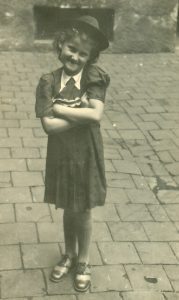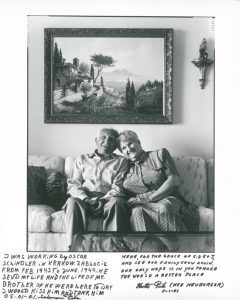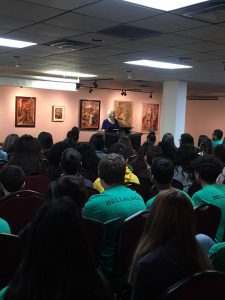Story #12 Herta Pila
 (Herta in 1939)
(Herta in 1939)
Herta explained that while Polish Jews were ejected from their homes without warning, things were different in Germany. “In Germany, you got a beautiful letter that on this day, with two suitcases, you’re supposed to be at this and this place, for ‘resettlement to the East.’” When Herta was eleven years old, the caretaker of the Jewish cemetery found out that Herta and her family were on the list to be resettled. Her brother, eight years older than her, refused to comply with the order and left home abruptly. “I figured that it couldn’t be anything good if my brother was leaving without saying one word and going,” she recalled.
Soon after, when Herta was home alone, a man came to the door. “I opened it a little bit, my mom wasn’t there. He said that I should come with him. I told him, ‘From the time I was little, I was told you don’t go with strangers,’ and then I just closed the door again.”
Later, he returned and told her that he was sent by the caretaker of the Jewish cemetery. “He was an elderly man with a white beard, and it could be recognized that somebody picked me up . . . . After the war, we found out that that he saved not just me, but he saved six other people.” He told her to come down to the cemetery without telling anyone where she was going.
After spending one night in the caretaker’s cabin, she hid the yellow star that had been sewn to her clothing and was put on a train to go to the countryside. German women and children, Herta explained, were often sent to the countryside, where bombings were less frequent. The caretaker’s daughter and her two small children were living there, in a farmhouse with no electricity or running water. “I was then introduced as the governess because Hitler made a rule that everybody over fourteen years old had to work for a year in a household to be good wives and mothers. So I was introduced as the nanny.”
Also in the house were people from another part of Germany, forcing Herta to hide her identity. “They couldn’t know who I was or what I was. And I wasn’t going to say a word. That much I knew.”
“I was the cook, I was the babysitter, I was the washing woman, I had to pump the water,” Herta recalled. “I learned an awful lot. She took a chance, too, by taking me in, you know. But she also was a good taskmaster, she really was.”
After the war, Herta learned that her mother and brother had both survived in hiding. Her mother had a friend in the countryside. “When we had the first letter [ordering ‘resettlement’], she asked her whether she would help us out and whether she would take us. She said, ‘You, alone, I take. But the kids I am not taking, because children are dangerous.’”
Her brother survived working for a farmer in the mountains, where he worked in exchange for food and shelter.
Her sister, seven years older than Herta, had been picked up in the street and was sent to the Theresienstadt concentration camp outside of Prague. After the liberation of Theresienstadt, she was held there for another month in medical quarantine before she was allowed to return to Munich and reunited with the family. “But she was a completely changed girl when she came back from there,” Herta observed.
After the war, Herta struggled to find a new home. “I didn’t want to stay in Germany,” Herta said. “Life right after the war was horrible. Munich was like a pile of rocks. Everywhere. Because of the bombings. You also couldn’t get anywhere or get food. I would stand in line for hours to get food and most of the time, when it was my turn, there was nothing left.”
 (Herta and her husband Salomon in 2001)
(Herta and her husband Salomon in 2001)
As a concentration camp survivor, Herta’s sister was granted a visa to the United States and was able to able to immigrate by 1947. Herta was able to obtain a visa for Australia. Soon after she moved to Australia, America began to accept larger numbers of Jewish immigrants, particularly those who were victims of the Holocaust. Because of this, Herta’s brother, and eventually her mother, were also able to move to the United States.
Herta’s first attempts to move from Australia to the United States were unsuccessful, as a six-year waiting period had been imposed for immigration to America. “I worked at a factory and they closed every day at three in the afternoon. By four, I would be at the American Embassy in Australia. Every week.” Eventually, she managed to meet with the ambassador, who, learning she was nineteen years old, advised her to have her mother, then in Miami, petition for a visa for her daughter. Shortly afterwards, Herta was granted an American visa and was reunited with her family. “Sometimes if you’re lucky, you’re just lucky,” Herta said.
Reflecting on the 25th anniversary of The Florida Holocaust Museum, Herta told us, “I think that, with our generation everyone is going out, it’s good that we have the Holocaust museum that has some of the artifacts that are being used in stories. It’s very worthwhile.”
She has recorded her testimony with the USC Shoah Foundation Visual History Archive, founded by Steven Spielberg after the making of the film Schindler’s List, and with the USF Holocaust Survivors Oral History Project. She now speaks to school groups whenever asked. “I usually go talk to The Florida Holocaust Museum if they need someone to go to a school.”
 (Herta speaking to middle school students at The Florida Holocaust Museum in 2018)
(Herta speaking to middle school students at The Florida Holocaust Museum in 2018)
“When we talk to kids, I always say that people need to be kinder, how they used to be. People were kinder. Not so much as giving you money, but helping others. You come to a strange country, not knowing the language, and you don’t know how things are done. They used to help. They used to try to explain why something is a certain way. But now that’s gone. Now, no one is helping anybody. It’s me, myself, and I. That’s not good. It really isn’t. It’s a different time.”
